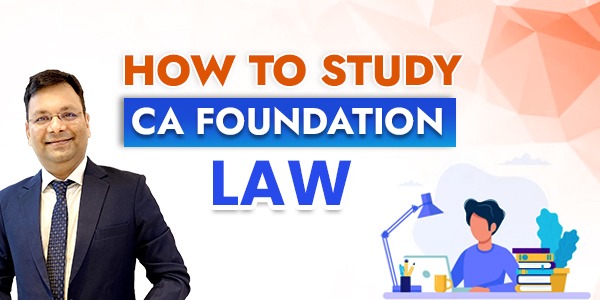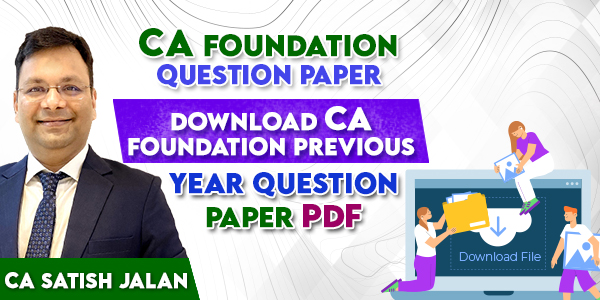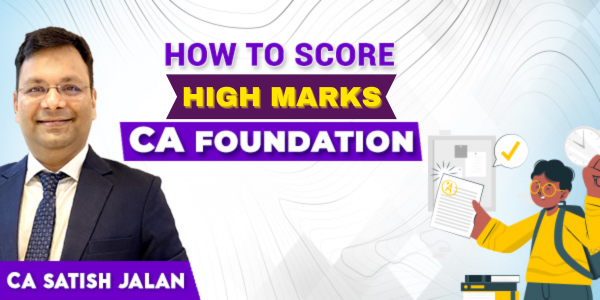06
Sep, 2023
How to Study CA Foundation Law?
-
CA Foundation, Exams, CA
CA Satish Jalan
Law is an essential aspect of the CA Foundation course, and while it may appear intimidating at first, you can efficiently navigate the subject with the appropriate approach and skills. This blog will teach you how to study law in a systematic and efficient manner. So let's get started and look at the techniques that will put you on the right track in your CA Foundation Law paper.
Strategies to Study CA Foundation Law Paper.
Studying for CA Foundation Law can be difficult due to the need to understand provisions and section numbers. And to solve this, we are here with some study strategies to help you succeed in this subject:
Clear Conceptual Understanding:
Concentrate on fully understanding the concepts and provisions. Take your time understanding the fundamental ideas and reasoning of the laws. This will help you relate to the questions and appropriately answer them.
Attend All of Your Law Classes On a Regular Basis:
Classes by experienced faculty members provide essential insights and explanations. Be present and attentive during these classes, and dissect the provisions in simple language, so that you can revise them at the end of the day.
Take Notes:
While attending classes, take clear and organised notes. Make a list of key provisions, case laws, and examples presented by the teachers. This will be a useful reference when revising and comprehending the provisions.
Mock Exams:
Take part in mock exams or practise the previous year's question papers. This will familiarise you with the exam format, time management, and the pattern of the question paper. Analyse your performance in these exams to uncover areas that need further work.
Systematic Revisions:
Law subjects demand regular and systematic revisions. Because clauses and section numbers can be difficult to remember, paraphrase the subject matter. Make a study schedule that incorporates many revisions of the subject to help you understand and recall it better.
Case Studies and Practical Examples:
Use case studies and practical examples to supplement your learning. Real-life scenarios will assist you in applying legal rules and improving your analytical skills. Understanding the real-world implications of the laws will help you answer questions more effectively.
Seek Clarification:
If you have any questions or are confused, don't be afraid to ask your teachers or classmates for help. Because the law can be complicated, it's important to get your questions answered as soon as possible to avoid misunderstandings.
Active Learning:
Actively engage with the study material by answering practice questions, attempting case studies, or taking quizzes. This hands-on approach can help you recall information and reinforce your understanding.
Is it Important to Learn Section Numbers?
While it is not compulsory to memorise and quote all section numbers in the CA Foundation Law exam, knowing and stating key section numbers can help in making a good impression. But mention the section numbers if you are certain about it, accuracy is important. To effectively demonstrate your knowledge, concentrate on comprehending the ideas and give well-structured answers.
How to Write Answers in the CA Foundation Exam?
Case-based questions are more common in the CA Foundation Law examination than theory questions. Keep in mind that examiners have a lot of papers to go through, so be concise and direct in your answers. Use the following format to structure your responses:
Case Facts/ Provisions
Analysis/Solution
Conclusion
Highlight important words to help the examiner's understanding. Answers that are clear and exact can make a difference in your outcomes, perhaps affecting your score.
Some Important Tips:
Here are some more tips for passing the CA Foundation Law exam:
Reverse Question Order:
Begin reading the question paper from the last to the first question. In this manner, you can start with easy and shorter questions to gain confidence and momentum before moving on to more difficult ones.
Prioritise Certain Questions:
Begin by answering the questions about which you are most confident. This allows you to swiftly secure marks and devote more effort to the more difficult problems later on.
Begin with the Law part:
It is best, to begin with the Law part before moving on to the Business Correspondence and Reporting (BCR) section. BCR questions often require careful reading and interpretation, which can take time.
With consistent effort and a well-rounded study plan, you can confidently approach the exam and achieve your desired results. Best of luck with your preparations!
Popular Posts






No Comments